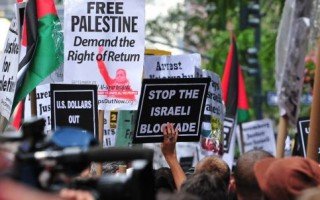An American college student gets her eye shot out by the Israeli Army in the West Bank. Israel kills nine, including one American in the massacre on the Mediterranean.
At what point do we understand that Israel is not a friend?
What America most needs is a political Intifada: Against Israel.

By Radhika Sainath
When evidence emerged that a North Korean torpedo sank a South Korean warship in disputed waters two months ago, Secretary of State Hillary Clinton strongly condemned the attack. Clinton demanded that Pyongyang “stop its provocative behavior, halt its policy of threats of belligerence towards its neighbors, and take irreversible steps to fulfill its denuclearization commitments and comply with international law.”
The US government, in turn refused to condemn, chastise or even nudge Israel into the boundaries of legality after its deadly attack on a humanitarian ship flying the Turkish flag in international waters on 31 May. Elite Israeli commandos boarded the vessel, Mavi Marmara, which was part of a six-boat, Freedom Flotilla of approximately 700 humanitarian workers bringing aid to to the besieged Gaza Strip, in the pre-dawn hours and killed at least nine passengers and injured dozens more.
Israel has sent the world a loud message: we will do whatever we want wherever want. So what if we, Israel, attack Turkey? So what if we kill civilians in international waters, an area which we do not even claim to control or have rights over? In response, the world gets the typical excuses and rationales it has come to expect from the United States, Egypt, and all the other states that should be levying demands on Israel to free Palestinians from siege, occupation and apartheid.
The Obama administration, the administration of “change,” has indicated that it is willing to jeopardize what the US perceives to be its strategic interests in occupying Iraq and Afghanistan — the US has military bases in Turkey and Turkey is a NATO member state — by its flaccid response to the Flotilla massacre. Sadly, this is not change. This is the American government that we have come to know and expect.
Still, there is hope. Formal diplomatic pressure doesn’t have to be the only mechanism to tame the rogue state of Israel. Protests around the world, many from countries with their own histories of colonial occupation and domestic repression, have erupted in response to Israel’s massacre. Hundreds of Filipinos, themselves reeling from a brutally contested election and eight years of repressive rule, took to the streets in support of the Freedom Flotilla and the Palestinian people. They joined thousands of Algerians, Bangladeshis, Egyptians, Indians, Indonesians, Jordanians, Lebanese, Mauritanians, Moroccans, Pakistanis, South Africans, the people of Hong Kong, Americans, Canadians, the English, France, Germans, Greeks, Irish, Spaniards, Swedes, Swiss, Turks, and yes, even Israelis, who oppose the policies of their government.
The historical analogies abound. Spectacular brutality by occupying powers can unleash social movements that lead to the dismantling of the perpetrating regime. The Sharpeville shootings in South Africa and the Amritsar massacre in India, for example, were both catalysts for extensive mobilization at home and abroad.
Like Israel, the apartheid regime in South African regularly flouted international law, and Reagan’s “constructive engagement” served only to prop up the regime with more aid and military technology. It was national strikes and demonstrations by South Africans themselves, assisted by global solidarity and divestment campaigns, which decisively toppled the regime.
While Gandhi’s successful Quit India Movement didn’t begin until more than 20 years after the Amritsar Massacre, the Palestinians have already started theirs — it’s called boycott, divestment and sanctions (BDS) and it is gaining momentum. Now is when international grassroots support is needed the most.
Palestinian freedom cannot be left to the haggling and horse-trading of diplomacy, which leaves the fate of millions of Palestinians hostage to international elite politicking. Instead, continued direct grassroots pressure on Israel both complements Palestinian indigenous resistance and raises the political costs of Israel’s refusal to end its siege and occupation.
People around the world are rising up not just because of Israeli human rights abuses, or the dire humanitarian situation in Gaza. They are protesting in solidarity because they see echoes of their own struggles to sit at the front of the bus, for taxation with representation, to live in communities free of foreign soldiers, and to travel in their homeland unfettered by walls and checkpoints.
Let us not overlook the urgency of this moment. Let’s urge our representatives to end military aid to Israel. Let’s not invest in Israeli corporations or buy Israeli products. Let’s follow the historic example of the South African trade unionists and refuse to offload Israeli ships and planes. Now is the time for us to call on our governments to be on the right side of history. Another humanitarian ship is en route to Gaza; what besides our pressure will guarantee its safe passage?
Radhika Sainath is a Los Angeles-based civil and human rights attorney. She was a member of the National Lawyers Guild fact-finding mission to the Gaza Strip in February 2009 and is an editor and author of Peace Under Fire: Israel/Palestine and the International Solidarity Movement
.
ATTENTION READERS
We See The World From All Sides and Want YOU To Be Fully InformedIn fact, intentional disinformation is a disgraceful scourge in media today. So to assuage any possible errant incorrect information posted herein, we strongly encourage you to seek corroboration from other non-VT sources before forming an educated opinion.
About VT - Policies & Disclosures - Comment Policy



